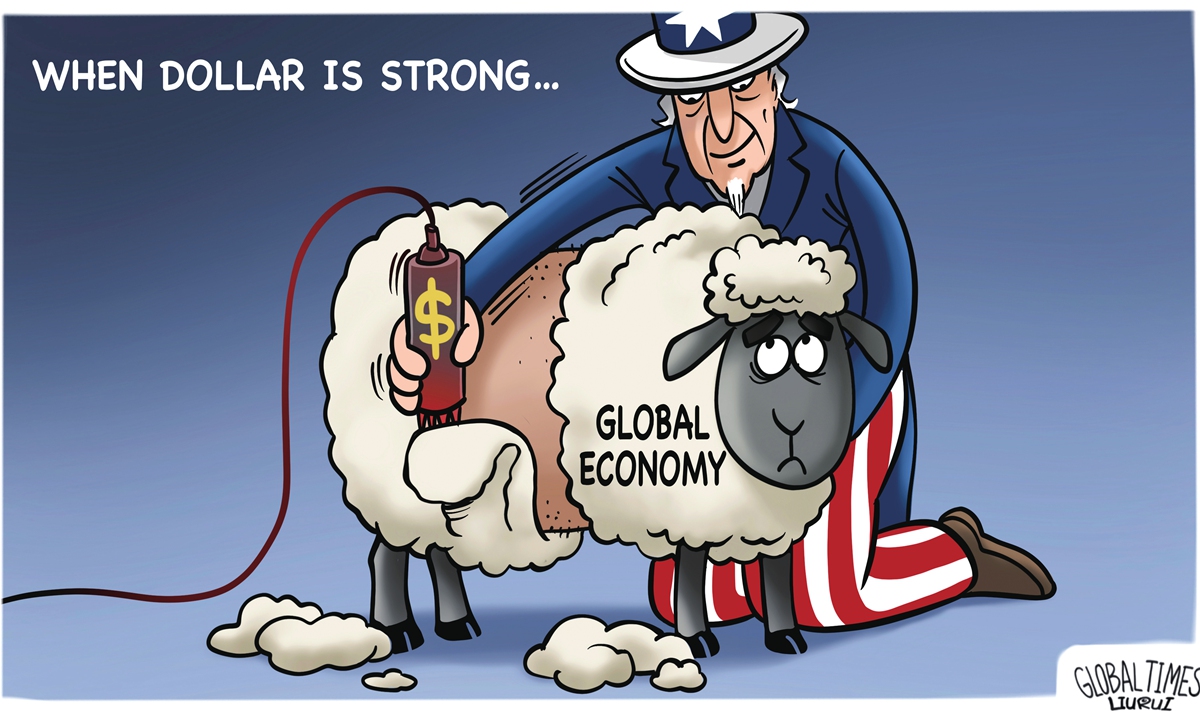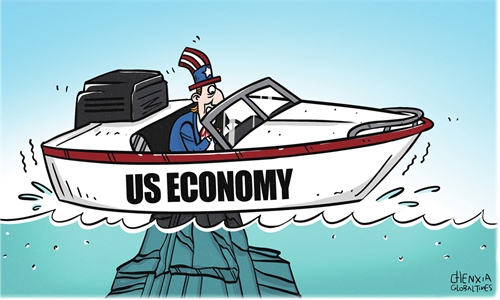
Illustration: Liu Rui/Global Times
They used to say that when America sneezes, the world catches a cold, meaning that, if the US economy is tanking, the economies of all the other countries will tank with it.
In 1929, a loss of confidence in the US stock market caused the Wall Street Crash and helped trigger the Great Depression. Likewise, the US-created global financial crisis of 2008 led directly to the Great Recession and the European debt crisis.
Today, the world economy is threatened once again by a financial sickness spreading from America: This time, it is the strong dollar. Global commodities like oil and gas are traded in the US dollar, and any increase in its value increases costs. Increased energy costs have an immediate impact on almost every other aspect of the global economy, adding to inflation.
It is ironic that a strong dollar makes products more expensive in terms of other currencies, because that currency's strength derives from the US Federal Reserve's efforts to curb domestic inflation. It is doing this by hiking its own interest rates.
This is good news for Americans, but not for the rest of the world.
High dollar interest rates help heal America's sickness, but also damage the global economy with something much worse than the common cold. The Fed's medication works instead by sending the illness abroad for other nations to endure.
In Britain, there is already a fiscal sickness. There is uncertainty generated by the war in Ukraine, rising inflation, currently hovering around 10 percent, and soaring commodity and energy prices. Making this all much worse is something rarely addressed by politicians in the UK: the impact of US interest rates and an irresistibly strong dollar.
There is also concern over the ability of new Prime Minister Liz Truss's inexperienced government to deal with these problems. It is possible that the pound will soon fall to one-for-one parity against the dollar for the first time in 37 years.
The new Chancellor of the Exchequer Kwasi Kwarteng is to deliver a mini budget to bring in winter tax cuts for millions of people and set out more detail on energy support.
If reports are correct, the Federal Reserve plans on Thursday to raise its already higher rates by 75 basis points. If this happens, it will undermine Britain's measure before it is even officially announced and pile even more pressure on the struggling pound.
Kwarteng is also expected to confirm reports that Britain will borrow £150 billion to hold down runaway domestic energy bills - a major recent cause of poverty in the UK and a major contributor to inflation. The effectiveness of such measures may be limited as they do not address the problem of the dollar hegemony itself.
On the contrary, as Kwarteng's rumored strategy is to pay for the price cap with increased borrowing, making Britain even more vulnerable to the impact of creeping US interest rates. The UK could become a hostage to fortune and the strategy may actually work counter to what the government is trying to achieve. The glory years of governments being able to borrow at historically low levels of interest are long gone.
The impact is not only in the UK. The stronger dollar has made everything traded in the US currency more expensive relative to all other currencies - and those other currencies less attractive to investors. The euro has plunged to its lowest level against the dollar for two decades, below parity. The Japanese Yen has slumped to its lowest for almost a quarter of a century.
Central banks may decide to act on the dollar's strength by responding with their own interest rate rises, but this is only a short-term response. In the longer term, some serious thinking is needed about how the world can move away from its dependency on the dollar and toward a new system. The dollar is seen as one of the world's most stable currencies. How perverse, then, that its stability can have a destabilizing effect on the world outside of the US. It is time to acknowledge the myth of dollar hegemony and seek an alternative.
Some small steps have already been taken. Russia, China, India and Saudi Arabia have recently traded, or are exploring to trade, in rubles, yuan and rupees as an alternative to US currency. It is time to change and explore new avenues. As other nations suffer, America will continue relentlessly down the same path to protect its domestic economy regardless of the effect elsewhere. America is curing itself of inflation by infecting the rest of the world with it. The buck must stop here.
The author is a journalist and lecturer living in Britain.opinion@globaltimes.com.cn

